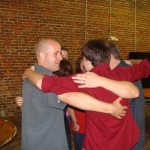Our Sundays are better than Dairy Queen (Part 1)
(This is a fictional story, inspired by a sign in front of a church building near my home.)
“Our Sundays are better than Dairy Queen.”
I shook my head as I read the words on the sign in front of the church building. But, then, those words were the very reason that I was here… standing in front of that same building… and now falling in line behind the others walking up the steps and through the large oak double doors.
A man in a suit smiled at me and handed me a bulletin. Seeing his suit, I was glad that I had worn khakis instead of shorts or blue jeans, and that I had chosen not to wear my flip flops. While I preferred to be more comfortable, I also didn’t want them to be uncomfortable. The polo was a good compromise.
“Welcome to Community Church,” the man said and held out his hand. I shook it firmly and thanked him for the welcome. “Is this your first time here?” he asked.
“Yes,” I answered. “I just moved into town and wanted to meet some brothers and sisters in Christ from the neighborhood.”
He seemed to grimace a little at “brothers and sisters,” but his smile returned as he pointed me into “the sanctuary.” “The service will start in about 15 minutes. You may get to meet the pastor before he kicks everything off.”
I thanked him again and walked into a large room with pews, stage, choir loft, pulpit… the normal furnishings. It was not the kind of place I preferred to meet brothers and sister, but I felt this was the place for me this morning.
Looking around the room, I noticed a group of people about half way up the aisle chatting together. I managed to find an empty seat right in the middle of the pack, and introduced myself. They were a nice group, mostly around my age.
It turns out that several of them had no plans after the service, and they were interested in my invitation. Just as we were talking about our plans, the pastor walked down the aisle, shaking hands and greeting people as he made his way to the front.
When he came to our group, I held out my hand and introduced myself. “I’m glad you’re here with us today,” the pastor smiled, and I genuinely believed him. “What bring you to our church?” he asked.
“The sign out front,” I answered honestly. (I had struggled with how to approach this issue, and decided direct honest was probably best.) “Did you know you misspelled ‘sundae’?” I winked at him.
“Is ‘sunday’ misspelled on the sign?” he answered surprised… I think he missed my wink. “I hadn’t noticed. I’ll make sure someone fixes that.”
“Yes,” I continued playing along. “‘Sundae’ is spelled s-u-n-d-a-e, but on the sign it’s spelled s-u-n-d-a-y.” Honestly, I was not trying to be a jerk. That’s just who I am, and it really is the reason that I was there that morning. “So, when do you serve your sundaes?” I asked.
He smiled at me… a little bigger. I hoped he understood.
“No, we don’t serve sundaes,” he answered good naturedly. “It’s a play on words.”
“Yeah, I know. But, I was wondering, would you and your family join me for sundaes at Dairy Queen this afternoon? My treat?”
“Ummm…” I think he was wondering what my angle was. What was I after?
“I’ve invited some other peope,” I pointed to the group around me. “I’m new to the area, and I just want to get to know some Christians from around here.” I checked my intentions… yes, I simply wanted to get to know my neighbors.
“I’ll check with my wife and get back to you after the service, okay?” he patted me on the back and walked up to the stage, taking a seat behind the pulpit.
I liked him. I really did. I could tell that he cared about people, and while he probably wasn’t sure about me yet, I could see us becoming good friends.
I chatted with the people around me for a while until the music started playing. The singing was really good. I knew some of the songs, and others were new to me. I appreciated the words of the songs, and I thought about them as much as possible.
The people around me, and as far as I could see the people around the room, were serious about their singing. I could only see a few people who appeared to be apathetic about the whole thing. I heard several of the men and women around me raising their voices to praise God.
When the pastor stood to preach, I admit that I was a little antsy. I had to not sat through a sermon in a long time. But, he did a very good job. His exegesis was solid, his presentation was understandable, and his application was challenging. I wanted to ask a few question – not because I disagreed with him, but because I didn’t understand something he said. Also, a story came to mind that I though would help some people with this teaching. I knew that I was not expected to say anything, so I didn’t. But, I did jot down a few things for later.
After the service was over, I talked to the people around me again, reminding them of my invitation. Several said they would meet me at Dairy Queen in a couple of hours. Some actually said they would go with me now and have lunch at Dairy Queen. Believe it or not, this was new to me. I only new about ice cream at Dairy Queen, but they told me that DQ had hamburgers, hot dogs, and chicken fingers.
I made my way to the back doors and shook the pastor’s hand again.
“So, do you think you and your family can join me at Dairy Queen this afternoon?” I asked again. “It turns out that some of us are going there for lunch now, and others are joining us for sundaes a little later – my treat, of course.”
“Well, I haven’t had a chance to talk with my wife yet. She’s in the nursery. I’ll have to let you know.” He turned and greeted the person behind me as I continued through the vestibule and out the front doors.
I noticed a few of my new friends lingering around in the parking lot – waiting for me probably – but I decided to try to meet a few more people. As I met people, I issued more invitations. Eventually I made my way to the men and women who were waiting for me.
“I need to wait a few more minutes before I go to DQ,” I told them. “If you want to go ahead, I’ll meet you there in a few minutes.”
One of the ladies spoke for the group, “No. We’ll wait.”
A few minutes later, the pastor walked out of the building with a woman and two children. He walked down the steps, over to our knot of people, and directly to me.
“Hey, is that offer still open?” he asked.
“Of course,” I said.
“Well, my kids heard me say Dairy Queen, so it looks like we’re coming,” he grinned really big. “Meet you there in about an hour?”
“Sounds great!” I answered.
The crowd separated, as we all made our way to our cars and headed for Dairy Queen.
(To be continued…)
Church Life in Christ: It’s all Connected
Five years ago, when I started this blog, I started it for a very specific reason: to study the purpose of the assembling of the church according to the New Testament. For that reason, I named the blog “The Assembling of the Church.” I was about to begin PhD studies (on the same topic), and I wanted this blog to be a place where I could write about and discuss my studies.
Over the years, I’ve learned something else very important: you cannot ONLY study the assembly of the church. Why? Because when it comes to our life together in Christ, it is all interconnected.
You see, we like to compartmentalize things, especially when we try to study them. Look at school subjects, even beginning with kindergarten and elementary school. There are times for specific activities and exercises and subjects.
Nothing changes when we get into the realm of theology – the study and understanding of God. We humans like to divide subject into smaller compartments (theology proper, Christology, Pneumatology, Anthropology, Ecclesiology etc.) and attempt to study just that one compartment or even a subset of that one compartment. For example, my particular topic of interest would be a subset of Ecclesiology, right? Well, yes. But it is also a subset of theology proper, Christology, Pneumatology, Anthropology, etc. Again, it is all interconnected.
Even when we think of ideas and topics and concepts that seem to relate only to Ecclesiology, we find they are truly interconnected within the topic of the church and also connected to the other areas of theology as well.
For example, I cannot study the purpose of the church assembling together in the New Testament without consider how that relates to Scripture, theology proper (God), Christology (Jesus Christ), Pneumatology (the Holy Spirit), Anthropology (mankind), etc.
Within the topic of ecclesiology, I cannot study the reason for Christians gathering together without also considering spiritual gifts (the reasons for them, the exercise of them, the extent of them, etc.), leadership (the nature of leadership and maturity among the church), our identity (both related to Christ and to one another), service (or “ministry” if you prefer), missions, etc. All of these topics are interrelated.
But, they are not only interconnected in our study; they are also interconnected in our life.
The way we meet together tells us a lot about what we think about God, Scripture, Jesus Christ, the Holy Spirit, mankind, the church, etc. Also, the way we meet together tells us a lot about what we think about spiritual gifts, leadership, our identity, service, missions, etc.
The opposite is true also. What we truly believe about the items listed above: God, Scripture, Jesus Christ, … spiritual gifts, leadership, identity… will affect the way we meet together.
Similarly, all of the things listed above cannot be separated from the way that we live our lives together. The way we share (or do not share) our lives together says a lot about what we believe, and vice versa.
It really is interconnected. As much as we try, we cannot separate them cleanly… and perhaps we shouldn’t try. Because when we separate them, we may find that we begin saying one thing while living a completely different way.
And, we must always remember… following Christ is a way of life, not a list of concepts.
What do you think?
Which is important for the church: edification or mission?
There is a bit of a feud (and that is a huge overstatement) going on between two of my friends – real friends – on their blogs.
It started when Eric at “A Pilgrim’s Progress” wrote the post “No Guarantee.” In the post, Eric exhorts the church to seek to edify one another. He concludes, “I simply want to encourage us all to be intentional in our efforts at mutual edification as the body gathers. Otherwise we miss the point of the meeting altogether.”
In response Dave Black (Wednesday, June 29, 2011 at 9:32 a.m.) says, without disagreeing with Eric, that the church’s purpose is mission. He writes, “As I understand Scripture, the church is to carry out the Missio Dei of the Triune God at both the micro (individual salvation) and macro (societal) levels, with a view to redemption, reconciliation, and social transformation.”
So, is edification important for the church or is mission important for the church? The answer is, obviously, YES! Both edification and mission are important – and vital and necessary – for the church.
As Eric pointed out, when the church gathers together – that is, whenever we are together with other brothers or sisters in Christ – our goal should be to build up one another – to help one another grow in maturity in Jesus Christ.
Edification is the responsibility of every believer – yes, every believer, not just leaders – whenever the church gather together. And, edification includes anything that allows us to help one another walk in the Spirit (put on Christ, mature in Christ, honor God – however you want to say it). We are all ministers (servants) given to the church by God to help the church grow in his grace.
For further explanation, see my recent post “Whenever you come together.”
But, as Dave pointed out, we are also to carry out the mission of God. This mission takes on both an individual aspect and a societal aspect. While proclaiming the good news of Jesus Christ to people we meet (with both our words AND our actions), we are also to be serving those around us (our neighbors, our co-workers, other students, others in our communities) in order to demonstrate the kingdom of God to the world.
Again, this is the responsibility of ALL believers – not just leaders or those who are “specially called.” We are God’s witnesses testifying of the good work that God is doing in our lives. We are all missionaries sent into the world by God to carry out his mission.
In fact, we may choose carry out this mission together – with other believers. In that case, our missional lives become a further opportunity to edify the church, thus carrying out both aspects of church life listed above: edification and mission.
(For further explanation, see my recent post “Our shared mission.”)
So, yes, when the church comes together, we are to build up one another in maturity in Jesus Christ. And, we are to carry out God’s mission as those sent into the world by God.
Both are important for the church.
Replay: Consider One Another… in Hebrews 10:24-25
Three years ago, I wrote a post called “Consider One Another.” The post examines Hebrews 10:24-25, especially the command “consider one another.” Unfortunately, this verse is often used to defend attending church worship services, while the meaning of the command itself is left alone. This is an important passage for the church.
——————————–
As I’ve mentioned previously and as is probably obvious from the title bar of my blog, one of my favorite passages of Scripture concerning the assembling of the church is Hebrews 10:24-25:
And let us consider how to stir up one another to love and good works, not neglecting to meet together, as is the habit of some, but encouraging one another, and all the more as you see the Day drawing near. (Hebrews 10:24-25 ESV)
I’ve talked about this passage previously in a few different posts (for example, see “But I have perfect attendance“, “Not forsaking, but encouraging“, and “Not forsaking the assembling of ourselves together“). However, in this post I’d like to consider the verb “consider”.
In context, these two verses comprise the third of three exhortations that help us learn how to respond to Jesus Christ – who both opened a new way for us into the very throne room of God and who is also our high priest. Because of these, we should respond by 1) drawing near to God (Heb. 10:22), 2) holding fast to our hope (Heb. 10:23), and 3) considering one another (Heb. 10:24). Thus, “considering how to stir up one another to love and good works” is a response to work of Jesus Christ – both his death and resurrection, and his continued work as our ever-present and sympathetic high priest. So, according to the author of Hebrews, “considering” is just as much a proper response and an important response to the gospel as is “drawing near” and “holding fast”
But, what does it mean to “consider one another”? The verb “consider” is related to the verb “perceive” or “understand”. An interesting use of this verb “consider” is found earlier in Hebrews:
Therefore, holy brothers, you who share in a heavenly calling, consider Jesus, the apostle and high priest of our confession, who was faithful to him who appointed him, just as Moses also was faithful in all God’s house. (Hebrews 3:1-2 ESV)
Just as the brothers and sisters were to “consider” Jesus and think seriously about his faithfulness, they were also to “consider” one another and think seriously about how to stir up one another to love and good works. This type of “consideration” calls for careful and intentional thought toward a certain goal. In the case of Hebrews 10:24, the “consideration” should lead toward action which would spur on others to demonstrate love and good works.
This last point is very important. I often find myself thinking about others in order to find fault or mistakes or points of disagreement. Since it is easier to see another’s speck of a problem while overlooking our own massive beam of a problem, we will also be able to find fault in other persons. But, this is not the type of “consideration” in this passage. When we respond properly to work of Jesus Christ, we find ourselves thinking about how to help others grow in maturity and how to help other demonstrate that maturity toward others – that is, through loving acts that demonstrate the love and goodness of God.
This type of “consideration” also assumes that we know enough about one another to know how to spur one another on to love and good works. We are sharing life with one another. We know one another’s strengths and weaknesses. We recognize where God is working in one another’s lives. We are concerned for one another. This seems to go beyond meeting for an hour or so each week. This seems to indicate a much more consistent and intentional relationship. It indicates that we are interrupting our own lives in order to include others.
It seems that “considering” Jesus (super)naturally leads us to “considering” others. Of course, this means that we have to stop “considering” ourselves. When we “consider” Jesus, we also “consider” others. John said that if we do not love others, then we are not loving God (i.e. 1 John 4:20-21). Could it be that if we are not finding ourselves thinking seriously about how to help one another grow in grace and maturity in Jesus Christ, then we are not actually “considering” Jesus?
Are you “considering” others? Now that you’re “considering” others, are you ready to take the next step and help them toward love and good works?
Whenever you come together
The primary focus of this blog – and my primary academic focus over the last few years – is church gatherings. Even more narrowly, I have been asking the following question: “According to the New Testament, why should believers gather together as the church?” (For that reason, just over five years ago, I named this blog “The Assembling of the Church.”)
Obviously, when you begin to study the gathering (or assembling) of the church, many other ecclesiological issues become important, not least of which would be leadership, fellowship, community, spiritual gifts, Lord’s Supper, baptism, and many, many more issues. In fact, a person’s understanding of the nature of God, of Jesus Christ, and of the Holy Spirit will affect the way that person gathers with other believers. And, in reverse, the way a person gathers with other believers demonstrates what that person understands about God, Jesus, the Spirit, salvation, etc. (In fact, the way people gather together often says more about their beliefs than what they state concerning those beliefs.)
In the modern church, you will find two primary reasons given for the church to gather together: 1) worship or 2) evangelism. Both of these fall short of the scriptural evidence. First, according to Paul and other writers in Scripture, every aspect of the life of a child of God is to be worship. Second, since we’re talking about the church (i.e., those who are already God’s children), then evangelism is not needed – they have already been evangelized. (This does not mean that believers should not work together for the express purpose of proclaiming the gospel to unbelievers, but this should not be called a gathering of the church.)
So, according to Scripture, for what purpose should believers gather together?
Paul answers this question very succinctly in 1 Corinthians. Now, when reading this letter, it is clear that the Corinthian church has many problems. Some of those problems surfaced when they gathered together. Paul addressed these issues in 1 Corinthians 14, as part of a longer section in which he addresses spiritual gifts.
However, from a grammatical and discourse standpoint, 1 Corinthians 14 – and especially the last half of the chapter – are the focus of this teaching on spiritual gifts in 1 Corinthians 12-14. Thus, Paul began teaching on spiritual gifts in 1 Corinthians 12:1 so that he could get to 1 Corinthians 14:1 and begin instructing them about meeting together.
So, according to Paul, why should believers gather together:
The one who speaks in a tongue builds up himself, but the one who prophesies builds up the church. Now I want you all to speak in tongues, but even more to prophesy. The one who prophesies is greater than the one who speaks in tongues, unless someone interprets, so that the church may be built up. (1 Corinthians 14:4-5 ESV)
So with yourselves, since you are eager for manifestations of the Spirit, strive to excel in building up the church. (1 Corinthians 14:12 ESV)
I thank God that I speak in tongues more than all of you. Nevertheless, in church I would rather speak five words with my mind in order to instruct others, than ten thousand words in a tongue. (1 Corinthians 14:18-19 ESV)
What then, brothers? When you come together, each one has a hymn, a lesson, a revelation, a tongue, or an interpretation. Let all things be done for building up. (1 Corinthians 14:26 ESV)
In each of these passages, Paul continuously and consistently stresses the same point: when you come together as the church, you should seek to build up (edify) one another. Notice that building up others is more important to Paul than manifesting some gift of the Holy Spirit. (He says it’s better not to manifest a gift of the Spirit if that gift only builds up the individual.)
Why is prophesy to be preferred over speaking in tongues (uninterpreted) when the church meets? Is prophesy inherently better than tongues? No, they are both manifestations of the Holy Spirit. But, when the church meets, exercising gifts of the Holy Spirit is not to be our goal. Our goal – our purpose – is to edify one another. So, prophesy is preferred over speaking in tongues when the church meets because the whole church can be edified through prophesy.
These statements are incredible in their scope. Paul says that when gathering with other believers – in fact, any time you are gathered with other believers – you should seek to edify one another, mutually. Paul does not leave an opening from some gatherings of believers in which mutual edification is NOT the purpose. The point of this entire chapter is clear: anytime we are with other believers, it is all of our responsibility to help one another grow in maturity in Jesus Christ. This is not the responsibility of some; it is the responsibility of all.
And, it is in this purpose of gathering together (mutual edification) that we understand Paul’s previous instructions concerning spiritual gifts (1 Corinthians 12) and love (1 Corinthians 13).
Can we come together for other purposes? Well, sure. We can come together for many different numbers of purposes. But, if we wish to follow the examples, principles, and instructions that we find in Scripture, then we will only come together for the purpose of building one another up.
Guest Blogger: A simple post about simple church
I’ve invited several people to write “guest blog posts” for this blog. There are several reasons for this: 1) To offer different perspectives. 2) To generate even more discussion and conversation between blogs. 3) To introduce other bloggers to my readers.
(If you are interested in writing a guest blog post, please contact me at aknox[at]sebts[dot]com.)
Today’s post was written by Bobby from “Deconstructing Neverland.” You can also follow Bobby on Twitter (@reformedlostboy) and Facebook.
————————————-
I was honored, humbled and frankly a little intimidated when Alan asked me if I would write a guest post for his blog. I love Alan’s blog because he has the ability and desire to make biblically educated and articulate arguments for many of the things I am beginning to learn about assembling with the church. Me? I usually blog on my phone on my lunchbreak and fly by the seat of my pants sharing the things that are on my heart at that particular time. I guess that’s what Alan wants since he asked for this post. Ask and you shall receive, my man.
I feel like the kid who was just handed the microphone on stage for the first time. I’m imagining you all in your underwear now…someone told me that would help. Guess you didn’t need to know that. Anyways…okay, deep breath, spill it.
I decided to share with you all some of the lessons I’ve learned so far in our journey into simple church life. It’s been quite a ride so far, kinda like being on an ancient roller coaster where the joy of the ride is coupled with the fear of your car flying off the tracks. It’s exhilarating and frightening. I’ve been warned of the ruts of even simple church becoming a religious exercise but thankfully it hasn’t become that for us. We are slowly and steadily growing together as a family.
When we gather together it’s pretty obvious that we have absolutely no idea what we’re doing. We’re depending on an invisible leader to make Himself visible through us. (before I felt like the visible leader made the rest of us invisible) It is quite remarkable! There have been times when a ten year old boy spoke words that the Holy Spirit used to change my heart in a very profound way. With no scripted order or designated speakers, God has a way of making the foolish and base things have extraordinary power.
My mind is reeling now with all the things I’d love to share: the intimacy between brethren that is steadily growing, the equipping of the younger members by the entire body, the food (THE FOOD!!!), sharing a meal together every week, knowing how to pray for one another and being able to pray right then and there for those requests, the various and sometimes disagreeable interpretations of scripture that provide variety without division, the nature to share and help one another as often as any has need, the ability to have questions asked and answered at any given time of the gathering, and so much more. I really could go on and on and write a post on each of these 🙂
What I’ve been learning lately is to be patient while Christ builds His church. Relationships take time to form. Our part is just to trust in Him, take off our masks with one another and be real. That’s how maturity comes to the body. Letting the ugly and sickly parts of the body be tended to and cared for by the rest. It’s a mutual thing to keep one another on the straight and narrow. We just focus our hearts on Christ and help one another do the same. When we are all about Christ together, we are the best church a church can be, no matter our size.
The beauty about Christ is you can point others in His direction no matter where you are. Institutional or simple doesn’t matter if He is the focus. We are all called to be that kind of minister. The abundant one anothers of scripture all lead us to one place: filled with the fullness of Him who fills all, in all. That is true for each and every believer. The fullness of God was pleased to dwell in Him and now He dwells in us. Let’s be his body and walk in faith together. What do ya say?
How leaders work WITH the church
In response to another blog post, Dave Black commented on leadership among the church. (See Friday, June 3, 2011 at 1:58 p.m.)
When speaking about leaders, he referred to a passage that is often overlooked. I mean, 1 Thessalonians 5:12-13 is not as sexy (from a leader’s perspective) as some of the other preferred passages. However, I think this passage is very important if we want to understand how leaders work WITH the church.
Yes, I said WITH the church, not for the church.
First, this is what Dave said:
Some, of course, will ask, “How could a man possibly work fulltime and pastor a church effectively? One or the other will have to suffer!” This is a perfectly reasonable objection. It is obvious to every non-professional minister that the average layperson spends most of his or her time weekly providing for their families. Since they spend an enormous amount of time working for a living, their “church time” can only be a fraction of their ministry. Of course, the solution to this problem is obvious. Simply put, Jesus Christ never entrusted leadership in a local church to a single individual. Leadership in the New Testament was shared. Not surprisingly, therefore, when Paul refers to church leaders (e.g., 1 Thess. 5:12-13) the reference is to a plurality of leadership. In order to be an equipping environment, then, the local church must be structured for shared leadership — what Michael Green wonderfully refers to as a “fellowship of leadership.”
Now, this is the passage he referred to:
We ask you, brothers, to respect those who labor among you and are over you [lead you] in the Lord and admonish you, and to esteem them very highly in love because of their work. Be at peace among yourselves. (1 Thessalonians 5:12-13 ESV – except the part I translated)
Now, you may wonder what this has to do with leaders working WITH the church. You have to read just before and just after that passage to see that part:
Therefore encourage one another and build one another up, just as you are doing. (1 Thessalonians 5:11 ESV)
And we urge you, brothers, admonish the idle, encourage the fainthearted, help the weak, be patient with them all. (1 Thessalonians 5:14 ESV)
You see, the work of leaders (“those who lead you”) is simply part of the work of all the “brothers and sisters” to encourage one another, build one another up, admonish the idle, encourage the fainthearted, help the weak, and be patient with all. All believers are instructed (commanded actually) to do this work. Leaders are doing this also, of course.
But, what if the leaders are doing this work while the church is not doing it also? Big problems… big, big problems.
Growing past church programs and activities is not easy
In a previous post, “Numbing our souls with church activities,” I said that church programs and activities keep us busy doing “good things” to the point that our souls become numbed to our real issues that we should be dealing with. However, recognizing the danger in filling our lives with programs and activities is only the first step, and the remaining steps toward growth are not easy.
To begin with, when we step away from the church programs and activities, we often learn that we don’t know how to serve people, to disciple people, to evangelize people, to teach people. All we know how to do is to attend programs. Even those who lead the programs often find themselves lost with the structures and confines of the program or activities.
This is probably most obvious when it comes to fellowship and activities. Often, those people that we feel closest to in the programs disappear when the program ends. We find that we do not really have relationships with those people. At the best, we have an acquaintance with one another.
It is a painful realization when we discover that we are actually very immature when it comes to service, teaching, evangelism, discipleship, and fellowship. The pain is enhanced for those of us who have been Christians for a long time. The pain, unfamiliarity, and discomfort often lead Christians to assume that it is wrong to move away from the programs and activities, and they begin to fill their lives with them again.
Once Christians grow beyond this stage, they began to form real relationships with other people. This is the next difficult step in growing past church programs and activities. Why? Because when we truly begin to grow in our relationships with one another, we learn people’s flaws as well as their strengths, and people learn about our flaws as well as our strengths as well. We can no longer hide behind church programs and activities.
Not only do we now have to learn to accept people in spite of their weaknesses, we have to trust other people with our own weaknesses. If we never reach this stage, then again our mutual growth will be hindered.
Once we are able to admit that we don’t truly know how to love God and others (because we had only been attending programs and activities), and once we admit that we don’t know how to build relationships with one another (we’ve only been acquaintances before), we are finally able to begin growing together.
The task is not easy. In fact, apart from Christ working in and through us by the Holy Spirit, the task is completely impossible. However, as we surrender ourselves to Christ together and learn to listen to, encourage, admonish, and help one another, we will find amazing growth toward maturity in Christ as a group.
No preaching, but plenty of teaching, encouragement, and discussion
I studied Act 3 last week. Why? Because as a church we’ve decided that we are going to study Acts together. So far, we studied through Acts 2 together, so yesterday we were planning to study Acts 3.
I was not scheduled to teach. In fact, another one of our brothers had said that he wanted to lead our study through Acts 3 yesterday. But, I studied anyway. Why? Because it’s not just “the teacher’s” responsibility to teach. So, I prepared to meet with my brothers and sisters by studying the passage during the week.
So, when we gathered together yesterday, it was clear that the one teaching was not the only person who had studied the passage. It was clear that he and I were not the only ones who had studied the passage.
I learned alot from the brother who had agreed to teach us. But, I also learned alot from several other brothers and sister who added what they had learned from the passage.
In fact, since I was able to hear from different people with different perspectives based on their own study, their experiences, their situation in life, and many other factors, I think I came away with a broader understanding of that passage.
And, I was challenged… man, was I challenged. What an example Luke provided for us in Acts 3!
We finally had to stop talking about the passage after an hour or so. But, of course, the conversation and encouragement continued in smaller groups of 2 and 3 while we ate lunch together.
So, no one preached Sunday. No one brought a monologue lecture. But, there was plenty of focus on Scripture with plenty of teaching, encouragement, and discussion!
Can a traditional church allow more participation?
I’ve enjoyed reading Chris’s blog “The Amplified Life.” He writes about both concepts and practices. I love that!
One of his latest posts is called “Open Sharing in a More Traditional Setting.”
Chris admits at the beginning of the post that they are the typical traditional church in America. But, recently, they’ve started allow others in the church the opportunity to speak.
Here is part of his description:
Whenever we begin the sharing time I open by saying, “Does anyone have any words of encouragement, testimonies, praises or prayer requests? What is God doing in our lives?” I specifically use that order because (1) I want people to be encouraged to share their “God stories” with the community; (2) it is important for others to hear what God is doing around us; (3) and while prayer is a great gift and very important, I don’t want it to turn into “Please pray for my aunt’s, nephew’s, brother’s, son’s, best friend’s sister’s pet gerbil.”
For the first few months we received mostly, if not all prayer requests. But then gradually we began to have others share some testimony. Then others would share a word of encouragement. Now, through the Holy Spirit’s guidance, it has taken on a life of it’s own. Sometimes we have taken 10-15 minutes during our “traditional” worship time to share what God has done and is doing and what we are praying to see God do. the feedback from the community is that it has become or is becoming one of their favorite aspects of our corporate gathering.
Now, I know that some of my readers are part of more organic churches that allow participation by anyone while they are meeting together. But, while you may think this group of believers has a long way to go, don’t overlook the fact that they are moving in a direction that is contrary to the traditional church in America.
And why are they doing this? Just for the sake of changing and being different? No! They are making this change because they believe it better aligns with what they’ve found in Scripture. (Chris talks about some of these passages of Scripture in his post.)
I praise God that these people have decided that it’s important for a larger part of the church to take part in the meetings, and they’ve started moving in that direction!
Do you know of other traditional churches who have made this kind of change, or one similar to it?










